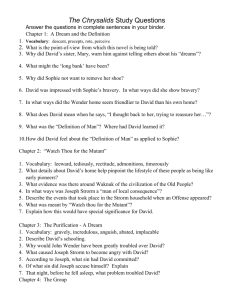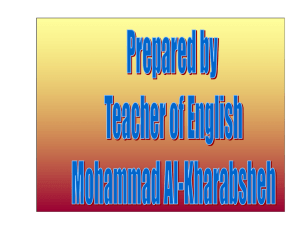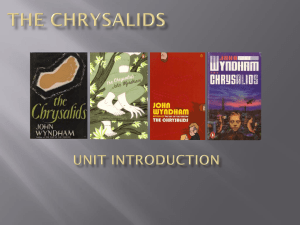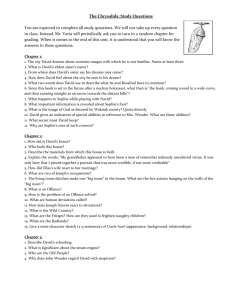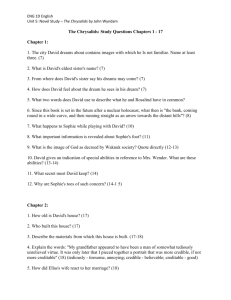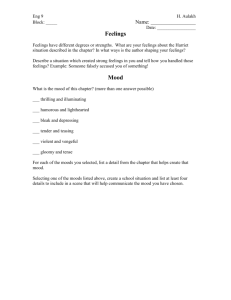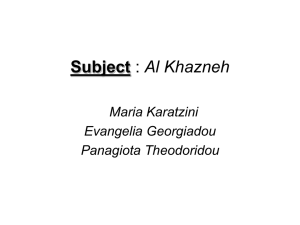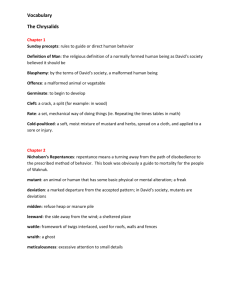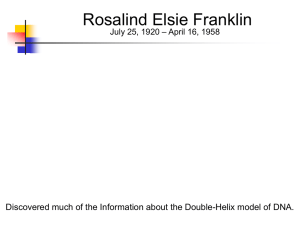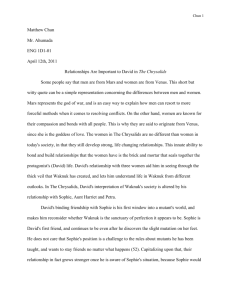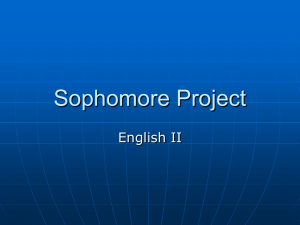Chapter 4
advertisement
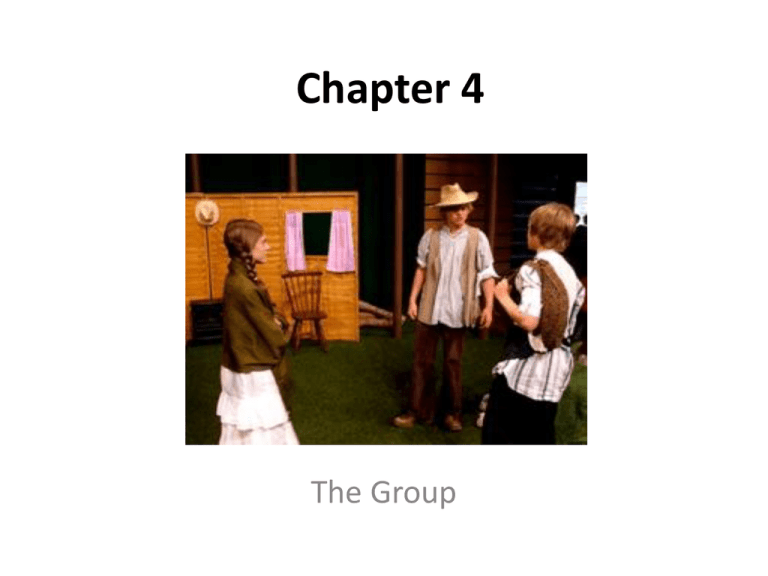
Chapter 4 The Group Chapter 4 1. “There was a time when I passed out of a placid period into one where things kept on happening.” a. b. Who says this quote? What were three “major happenings” in this chapter? 2. “I want you to keep it a secret. I want you to promise me that you will never, never tell anyone else what you just told me – never.” a. b. c. Who made this statement, and to whom was he speaking? What was he talking about? Why did he feel so strongly about this? Chapter 4 3. “As he sat on his horse, looking around, he noticed me; casually at first, in passing, then his gaze switched back and he stared hard at me. A strange look that I did not understand at all came into his eyes.” a. Who is the man in this passage? b. What struck David so strongly about this man? c. How did the man’s presence affect Joseph Strorm? 4. How did Joseph Strorm feel about Angus Morton? What major disagreement did he have with him? 5. Did Joseph Strorm always support and accept the law of the land? Explain your answer. Chapter 4 6. Reread pp. 40-41. Outline David’s understanding of the world, in your own words. 7. “Why had it been sent was as yet unrevealed, but, judging by precedent, there had likely been a phase of irreligious arrogance prevailing at the time…” a. To what is “it” referring? b. What is “irreligious arrogance”? c. What is the probable time when this “arrogance” occurred? Chapter 5 Discovery and Flight Chapter 5 1. Describe the ratio of offences “this spring”. 2. What happened to Angus Morton that pleased Joseph Strorm? 3. Explain this statement: “Sophie’s upbringing had given her a timidity towards strangers that was nearly an instinct.” 4. Why did the Wenders have no choice but to leave? 5. How did David know how Mrs. Wender really felt about him? Chapter 5 6. Why did Mr. Wender ask David to spend the night? Why was this dangerous for him? 7. In what way did the Inspector try to protect David? 8. What was the major emotion David felt the next day? 9. What do you think David meant when he said, “I couldn’t help it…”? Chapter 6 A Geography Lesson from Uncle Axel Chapter 6 1. What is meant by “abetting a concealment”? 2. The inspector told David that “loyalty is a great virtue, but there’s such a thing as misplaced loyalty”. What does he mean by “misplaced loyalty”? 3. Why was the group shocked about David’s relationship with Sophie? Why was this reaction ironic? 4. Uncle Axel discouraged David from running away by telling him, “Whatever district you’re in, they want to see your Normalcy Certificate.” a. What is a Normalcy Certificate? b. Since David had one, why was this a problem? Chapter 6 5. What are three things that Uncle Axel tells David about the lands to the South? 6. What is one common thing that all the deviant people believe about themselves? 7. What does Uncle Axel tell David about his beliefs concerning truth and the “true image”? 8. How many people have the power of E.S.P.? Chapter 7 A Baby and a False Image Literary Devices – Parallelism parallel – two lines on the same plane that are equidistant apart at all points and never intersect You can tell mathematically if two lines are parallel because the transversal (t) produces congruent angles. Literary Devices – Parallelism Parallel – having the same direction, course, nature, or tendency; corresponding; similar; analogous In literature, parallel structure takes place when elements of a story are arranged or constructed to create a direct comparison between the two aspects of the work. Arranging parallel elements leads the reader to compare and contrast the two things, recognizing both how they are similar, and how they are different. As we read Ch. 7, note the parallel that is constructed, and consider what the author might be trying to show through the contrast. Chapter 7 1. Why was the arrival of Petra not a particularly-happy experience? 2. Why did the inspector delay his inspection of the new baby? 3. What was the favour that Aunt Harriet asked of David’s mother? 4. What was David’s father’s reaction to Harriet’s request? 5. Why did David’s mother cry? 6. What happened to Aunt Harriet? 7. Our attitudes to people who are different are in some respects similar to those in Waknuk. Comment on this. Chapter 8 A Rusted Mirror – Axel Has Doubts Chapter 8 1. Why is David’s wish to be like other people ironic? 2. How might David’s prayer be considered ironic? 3. What happened to the boy who stopped communicating? 4. What does Axel believe about Tribulation? 5. Why does Axel think it is foolish to be like the Old People? 6. According to Axel, what makes a person different from an animal? 7. What did Michael do that the rest of the group did not? How is this advantageous to the rest of the group? 8. How long were the group in contact before the birth of Petra? 9. How old is David at the conclusion of Chapter 8? Chapter 9 Old Jacob’s Views, and a Problem Chapter 9 1. Was Petra spoiled? Quote a sentence that shows this. 2. Why did Rosalind tell David that Petra isn’t one of us. 3. Why did Rosalind feel it was not a good idea to talk to Petra about thought projection? 4. What did “the eight” believe that they had to do to survive? 5. What did Old Jacob claim was indicated by the rate of offences this spring? Chapter 10 Love, Marriage, Murder, Suicide Chapter 10 1. Who was Anne marrying? Where had he appeared in the novel previously? 2. Why would marriage to a “norm” be an intolerable situation to one of the eight? (Note a few problems it would present.) 3. For what main reason did the group not want her to marry? Why did Anne refuse their advice about marrying a norm? 4. Why do you think Rosalind intimidated the men who were attracted to her? How did she react to their interest? 5. What did Axel feel should be done? Why does he think so? Chapter 10 6. What did Axel feel should be done? Why does he think so? 7. Describe the relationship between David and Rosalind’s father. 8. What happened to Anne’s husband? Who do you think did it? Why did they do it? 9. What had Anne been planning to do? 10. Describe the thing given to Rachel by Anne’s neighbour. 11. What happened to Anne? How did the people of Waknuk explain it? Chapter 11 The Education of Petra Chapter 11 1. Describe Petra’s predicament in this chapter. 2. How and why did the rescue of Petra arouse suspicions? 3. Which of Petra’s thoughts puzzle David? 4. How do David’s past dreams relate to the information revealed in this chapter? 5. In which location did Axel discover someone knew all about the group? Chapter 11 6. What puzzle is solved by Axel’s confession? 7. Why would David have to kill Petra rather than let her be caught? 8. What happens to women before they are sent to the Fringes? Why? 9. What indications are there that Michael has emerged as the group’s leader? Structure of a Novel Like other story genres, novels are structured with a beginning, middle, and end. Structurally, it follows the same basic pattern as a short story, and contains many of the same elements. Plot Structure In terms of the main themes of the novel, the parts of the plot parallel one another: Discovery/Self-discovery. Act I – Discovery: A build-up of tension through the parallel of the fear of discovery by the people of Waknuk and David’s self-discovery. Main Crises: Discovery of difference through Sophie David’s discovery of his own difference David discovers the world (through Uncle Axel) David discovers personal danger (through his father) Sophie is discovered and captured Aunt Harriet’s baby is discovered = death Anne’s letter reveals The Group (near miss) The Group revealed by Petra’s tree incident = END ACT I Chapter 12 Flight to the Fringes Chapter 12 1. What dramatic news interrupts David’s sleep? 2. How did Rosalind attempt to conceal the trail of their flight? 3. Which members of the group have been captured, and which are still free? 4. Explain the roles Michael and Mark will play in the escape. Chapter 12 5. What news comes to Rosalind and David from Sally? 6. According to Michael, why were the people of Waknuk claiming to be so upset about the group? As a result, what course of action had they proclaimed? 7. What interrupts Michael’s thought conversation with Petra? 8. Why is the description of Sealand so important to David? Chapter 13 Message from Sealand Chapter 13 1. What message did the group receive from the Sealanders regarding Petra? 2. What impression did David and Rosalind get from the Sealanders that was disturbing, and maybe even insulting? 3. What two major things did David receive in his message from Michael? 4. What was Petra’s reaction to Michael’s message? Chapter 13 5. How did the contact person in Sealand view Petra’s abilities? 6. How do the people in Sealand view those who can’t make think-pictures? 7. Why did David consider getting rid of the great horses? How was this choice taken from him? Re-read David’s explanation to Petra about why they are running for their lives, and the people who operate based upon “feel things” rather than “think things”. What comment is the author making here about our own society? Speculate on how you think this relates to the main theme(s) of the novel. (Hint: Remember the original manuscript title.) Chapter 14 The Spider-man Chapter 14 1. What two different personalities did David describe Rosalind as having? 2. Why was David so uncomfortable when he woke up? 3. What had happened to David and Rosalind? 4. How many men from Waknuk were searching for David and Rosalind? 5. What is the problem with determining the “Old People’s Standards”? (pp. 154-155) Chapter 14 6. What was the weakness of the Old People according to Petra’s new friend from Sealand? 7. Explain the relationship between David and the “Spiderman”. 8. Explain why the Spider-man was so bitter towards the society from which he was exiled. 9. What are Rosalind’s feelings towards the Spider-man? Why? Chapter 15 Sophie Chapter 15 1. Who rescued David? Where did she take him? 2. The biggest worry that Sophie had about Rosalind was that she could give the Spider-man something that Sophie herself could not. What was that? 3. Describe your impression of Sophie’s living quarters. 4. What did Petra do that frightened everyone? 5. How far away were the people from Sealand at this point? 6. Why would Sophie not allow David to help to rescue Rosalind? Chapter 16 A Place Among the Fossils Symbolic Imagery – The use of something concrete (a thing) to represent something abstract (an idea). Structure of a Novel Like other story genres, novels are structured with a beginning, middle, and end. Structurally, it follows the same basic pattern as a short story, and contains many of the same elements. Plot Structure In terms of the main themes of the novel, the parts of the plot parallel one another: Confrontation. Act II – Confrontation: In this part, the tension is maintained through the immediate threat of death (and reminders of it). Chapter 16 1. Why do the Waknuk residents wear large crosses on their outfits? 2. Why does Sophie tell Rosalind to remove the cross from her dress? 3. What does Sophie mean when she says, “And what’s the use? Oh, God, what’s the use? If he weren’t in love with you, what good would I be to him – like this?” (p. 177) 4. Why is David so concerned with whether or not his father is in the search party? 5. How did the woman from Sealand describe the Badlands? Chapter 16 6. What is the attitude of the Sealand woman to “his kind and his kind of thinking”? 7. Even though David knew the battle plan of the searchers, why was he not able to warn the people from the Fringes? 8. This chapter is the climax of the novel. What is the event that marks the climax? 9. Why does David not respond emotionally to this? Structure of a Novel Like other story genres, novels are structured with a beginning, middle, and end. Structurally, it follows the same basic pattern as a short story, and contains many of the same elements. Plot Structure In terms of the main themes of the novel, the parts of the plot parallel one another: Confrontation. Act II – Confrontation: In this part, the tension is maintained through the immediate threat of death (and reminders of it). Main Crises: Flight from Waknuk + group split (tension rises sharply) Rosalind kills pursuer = death (immediate danger) Waknuk declares war + takes prisoners (immediate danger) Sealanders contact Petra (tension about future) Man on horseback attacks them (immediate danger, near miss) Fringes people attack them (immediate danger) Rosalind and Petra taken, David ejected from Fringes (future uncertain) Sophie returns (sub-plot restored) Sophie kills captor, rescues girls = death War in Fringes camp (climax) Joseph Strorm killed = END ACT II Notice that the death of Joseph Strorm provides a real and symbolic ending to the tensions of the novel so far. Chapter 17 A Brave New World Chapter 17 1. Why did Michael have second thoughts, instead of making a run for it? 2. Why was the woman from Sealand in awe of Petra, even though she is only a child? 3. Why was it impossible to return to Waknuk to pick up Rachel? 4. Explain the woman from Sealand’s emotional response to the dead bodies littering the ground. Chapter 17 5. What does David mean when he says, “I did not have the power of detachment that would allow me to think of myself as another species” (196)? 6. What is Michael’s solution to the problem of rescuing Rachel? 7. Explain the following quotation: “The underRosalind was in her face, smiling, shiny-eyed.” 8. In your opinion, is the ending suitable? Why or why not? “brave new world…” Shakespeare’s play The Tempest is about a wizard, Prospero, who lives on an island with his teenage daughter, Miranda, and some spirits/creatures. A terrible storm forces a ship to crash near the island. Several people are on the ship, including the son of a Duke and a couple of lords and a jester. The lords and jester are drunks and thieves. Throughout the story, Miranda meets and falls in love with Ferdinand, who is the first man (besides her father) who she has seen in her young life. Almost at the end of the story (Act V, sc. i) she encounters the other men (drunken, thieving lords and jester), and says a famous ironic quote: Miranda: O wonder! How many goodly creatures are there here! How beauteous mankind is! O brave new world! That has such people in't! How is this quote ironic? What does it say about youth? Knowledge? Being naïve? How can you apply it to this novel? The ending of this story is problematic. What problems are left at the end of the story? Why?!? Shouldn’t stories be neat and tidy? The answer is that you might have to change your idea of literature. Literature is ART. Literature is Art The first layer of analysis is an assessment of “good/bad”, or “Did you like it?” There is much more to analyzing art, though! Look at the images that follow, and we will discuss them. Questions About Art Did you like it? Do you see any themes/motifs? What do you think the art means? What does the art mean to you? What do you think the artist intended when he/she created the art for an audience? In English class, you learn theories and frameworks for analyzing literature as art -- but, what you have to understand is that ART IS NOT SOMETHING YOU “ FIGURE OUT”. There are not “hidden meanings”, but there are “meanings” that you can uncover and argue. There are only weak and strong arguments about those meanings. Artist Medium (art) Receiver The communication model above demonstrates the relationship between an artist and the receiver of the art. When an artist sets out to create art, she/he determines three main things: Purpose: What am I trying to accomplish? Audience: For whom am I creating this art? Medium: What art form am I going to use? Three Purposes of Literature 1. To entertain 2. To teach 3. To raise questions (about things already decided) Analyzing literature intellectually requires the awareness that any text does all three of these things simultaneously – although the author may intend one or more of them explicitly. When you read and evaluate literature, you must be aware of these three purposes, and make decisions for yourself. Which purpose(s) does this novel serve? What do you think the author is trying to say? Think about these statements. Could you make arguments using the novel? The novel is primarily an anti-religious novel. The novel is primarily an anti-bigotry novel. The novel is primarily about accepting scientific knowledge over revealed knowledge. Uncle Axel is the hero of the novel.
